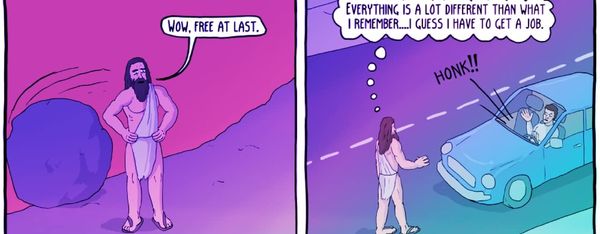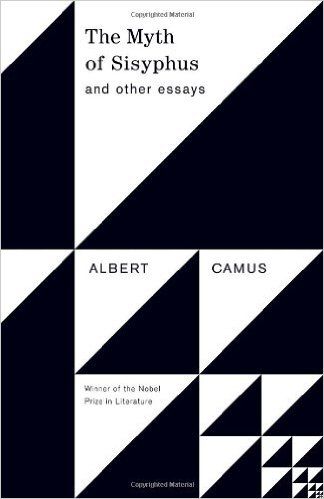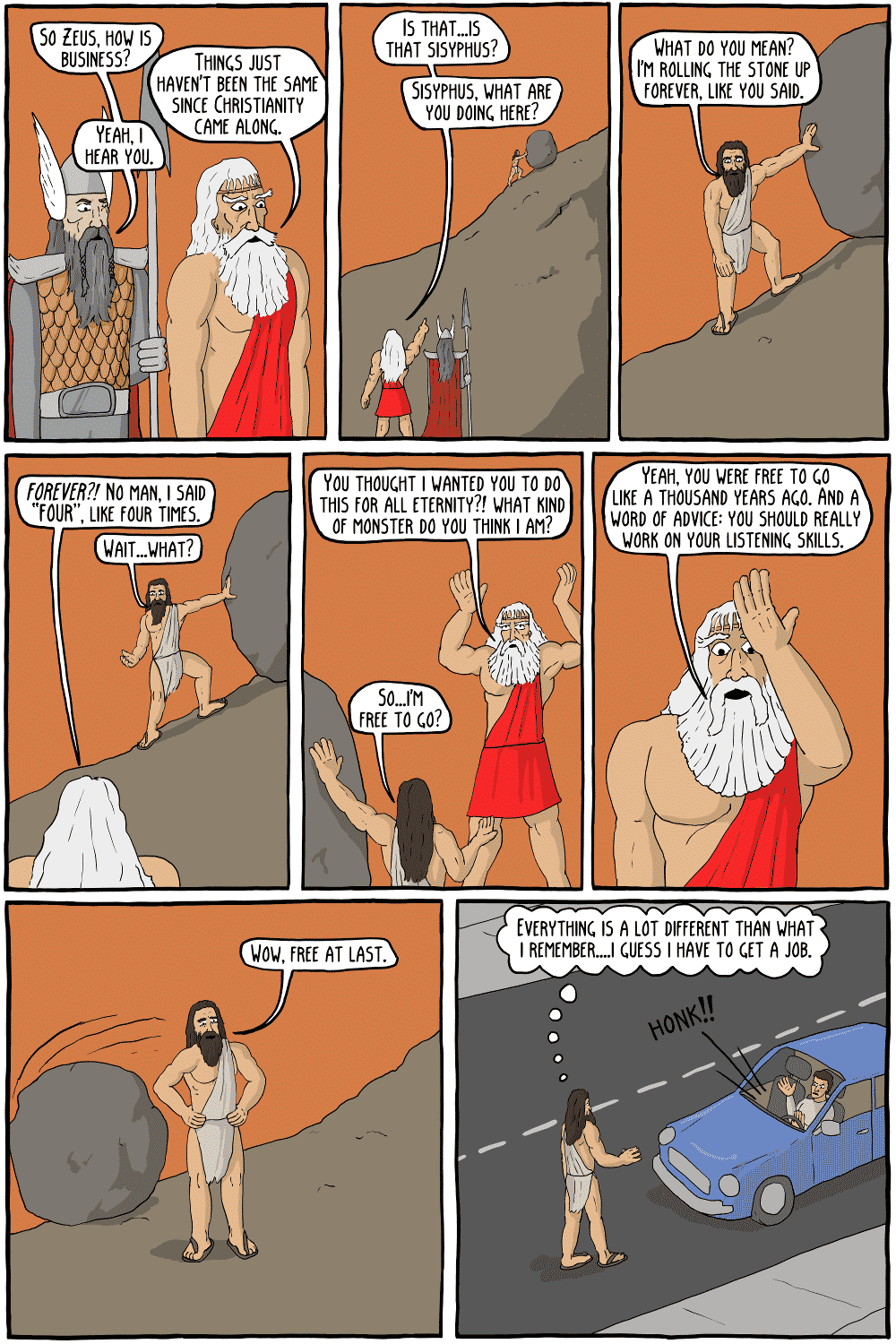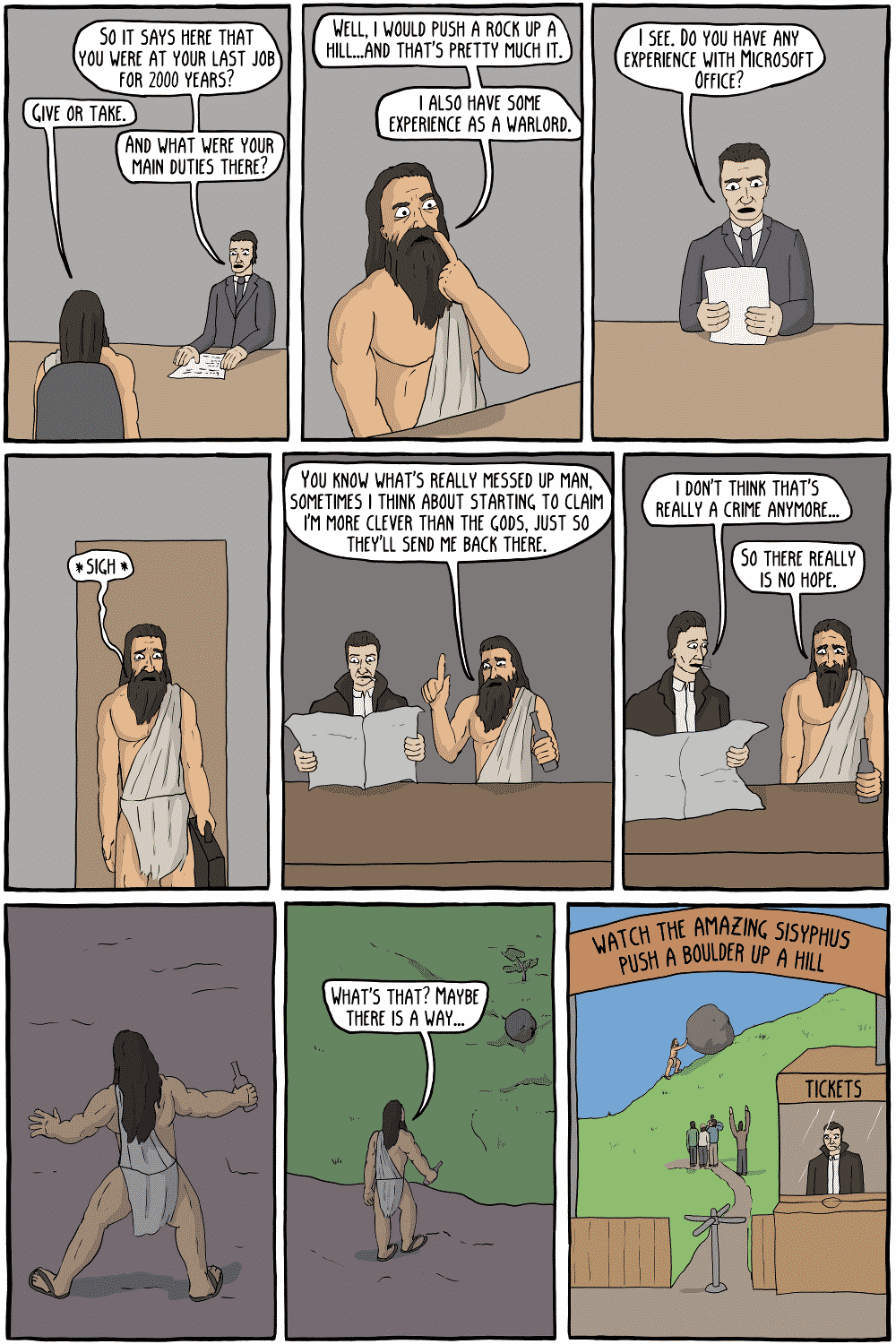Jordan Bates • • 5 min read
Existential Comic: We Must Imagine Sisyphus as Having a Hard Time Readjusting to Civilian Life

In 1942, the existentialist Albert Camus famously wrote, “We must imagine Sisyphus happy.”
Camus was referring to Sisyphus, the unlucky dude in Greek mythology who has to roll a boulder up and down a hill forever because of his chronic deceitfulness.

In his essay, The Myth of Sisyphus, Camus used the story of Sisyphus as an allegory to represent his philosophy of the absurd. From Wikipedia:
“In the essay, Camus introduces his philosophy of the absurd: man’s futile search for meaning, unity, and clarity in the face of an unintelligible world devoid of God and eternal truths or values. Does the realization of the absurd require suicide? Camus answers: ‘No. It requires revolt.’ He then outlines several approaches to the absurd life. The final chapter compares the absurdity of man’s life with the situation of Sisyphus, a figure of Greek mythology who was condemned to repeat forever the same meaningless task of pushing a boulder up a mountain, only to see it roll down again. The essay concludes, ‘The struggle itself […] is enough to fill a man’s heart. One must imagine Sisyphus happy.'”
So Camus argues that man is faced with an absurd predicament: being a meaning-making creature in an meaningless universe. He compares the human experience and specifically the experiences of the people of his time—spending their lives working futile jobs in factories and offices—with the absurd life of Sisyphus, the tragic hero. Ultimately, he argues that if Sisyphus acknowledges the futility of his task and the certainty of his fate, that he can then be free to recognize the absurdity of his situation and reach a state of contented acceptance.
This, Camus argues, is what we must likewise do in order to reach a state of contentment or happiness. That is, we must recognize the absurdity of our predicament as meaning-making creatures in a meaningless universe in order to reach a place of acceptance of this condition and to be okay with living out the day-to-day details of our existences. Camus concludes the essay by suggesting that “one must imagine Sisyphus happy,” indicating that meditating upon a happy Sisyphus can be instructive in realizing how to be content with one’s own life.
Read this: 21st-Century Sisyphus: Brilliant Comic Asks if Your Life is Meaningless
‘We Must Imagine Sisyphus as Having a Hard Time Readjusting to Civilian Life’ by Existential Comics
The ever-entertaining Existential Comics recently published a new comic exploring a decidedly hilarious hypothetical question: What would happen if Sisyphus were released from his eternal bondage and returned to civilian life in 2016?
The results of the thought experiment are chuckle-worthy to say the least. Enjoy.


Read this: Friedrich Nietzsche's Guide to Conquering Your Existence
Oh, the Irony
Hopefully you got a few LOLz out of that gem. The great irony, as it turns out, is that Sisyphus apparently was happy rolling the boulder up and down a hill for eternity. Or, at least, he was much happier than he became as soon as he was faced with the predicament of navigating a modern career. With characteristic satirical wit, Corey Mohler of Existential Comics subtly suggests that pushing a boulder up a hill for eternity would be preferable to executing a contemporary job search.
A Critique of Existentialism
This article seems like an appropriate place to mention that I am no longer as smitten as I once was by the claims of existentialists such as Camus and Nietzsche. I still see immense value in their work, but I also suspect that they got some things wrong.
Recently, I’ve been immersed in an online hypertext book called Meaningness, written by a cognitive scientist named David Chapman. The book is all about “the quality of being meaningful and/or meaningless.” Chapman calls this quality “meaningness.” This concept probably seems fairly arcane and abstract if you’re encountering it for the first time. However, after delving minimally into the book, one begins to see meaningness as a very real and fundamental feature of our day-to-day experience. Beyond that, one sees that how one relates to meaningness has profound implications for how one thinks, feels, and acts, and how much fulfillment one finds in life.
Chapman is fond of existentialism, particularly Camus’ work. However, he asserts that existentialism was incorrect in suggesting that the only meaning to be found in life is of a purely subjective variety. Instead, he argues compellingly that meaningness is neither objective nor subjective. Rather, it is a kind of nebulous interplay between the objective and subjective. Chapman writes:
“Existentialists tried to create a third possibility: that meaning could be subjective rather than objective. In fact, they said, ‘authentic’ meaning had to be subjective: a purely individual choice or creation, without any justification. They claimed that perfect internal freedom of choice made this possible, whatever the external circumstances.
This can’t work. Meaning is a collaborative activity. It is neither objective nor subjective. It is created by interaction, and abides in that space-between. Also, we do not have perfect internal freedom. Selves are constituted by biology and by society and culture. People cannot become ideal independent rational agents with perfectly-crisp boundaries and unlimited free will.”
Elsewhere, he further elaborates on the nebulous nature of meaningness:
“However, there isn’t any meaning like that. The only kind that exists is nebulous: ambiguous, fluctuating, uncertain; like a dance, not like a statue. That might seem unsatisfactory at first. However, once you accept that meaning is like that, you can see that it’s actually much better than the hypothetical solid kind of meaning. It provides freedom and creativity and exploration and lightness, where the given-by-God kind of meaning would be restrictive, dull, heavy, boring, and inescapable. If the universe had inherent meaning we would all be living in a totalitarian prison.”
Existentialism suggests that we are personally responsible for willing our own purpose in life. Chapman rejects this, suggesting that our purposes for living will always arise in an interaction between our subjective preferences and the objective conditions of our lives. He also rejects the idea that materialistic, hedonistic purposes are solely meaningful, as well as the idea that every person has a “higher purpose” which accords with some kind of “cosmic plan.” He sees both “mundane purposes”—materialistic, hedonistic purposes—and “eternal purposes”—altruistic, creative purposes—as being valid sources of meaning, some of the time. As such, he suggests that seeking “enjoyable usefulness“—activities which are both useful and enjoyable—is a path toward resolving the problems that arise from holding a confused stance with regard to purpose.
This should give you a taste of the sorts of ideas you’ll find in Meaningness. The book isn’t merely about the individual’s relationship with meaningness, though. It also delves deeply into the history of human social organization and how our collective relationship with meaningness has shifted over time. This ends up leading to some extraordinarily illuminating analyses of the American culture war and the unsettling political landscape in the US.
I find Chapman’s writing to be profoundly insightful and liberating. He seems to have genuinely resolved some problems with existentialism and other ways of relating to meaningness that I had vaguely detected but could not articulate. I highly recommend reading Meaningness and his other work.
If you wish to say “Yes!” to existence and reach a place of contented acceptance, our new course was designed for you.

Jordan Bates
Jordan Bates is a lover of God, father, leadership coach, heart healer, writer, artist, and long-time co-creator of HighExistence. — www.jordanbates.life


![Seneca’s Groundless Fears: 11 Stoic Principles for Overcoming Panic [Video]](/content/images/size/w600/wp-content/uploads/2020/04/seneca.png)







